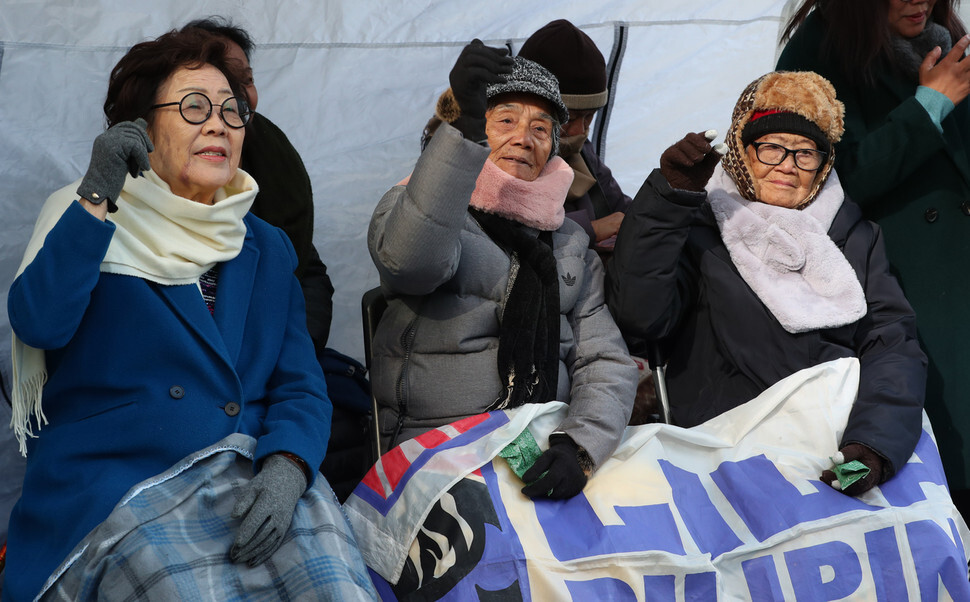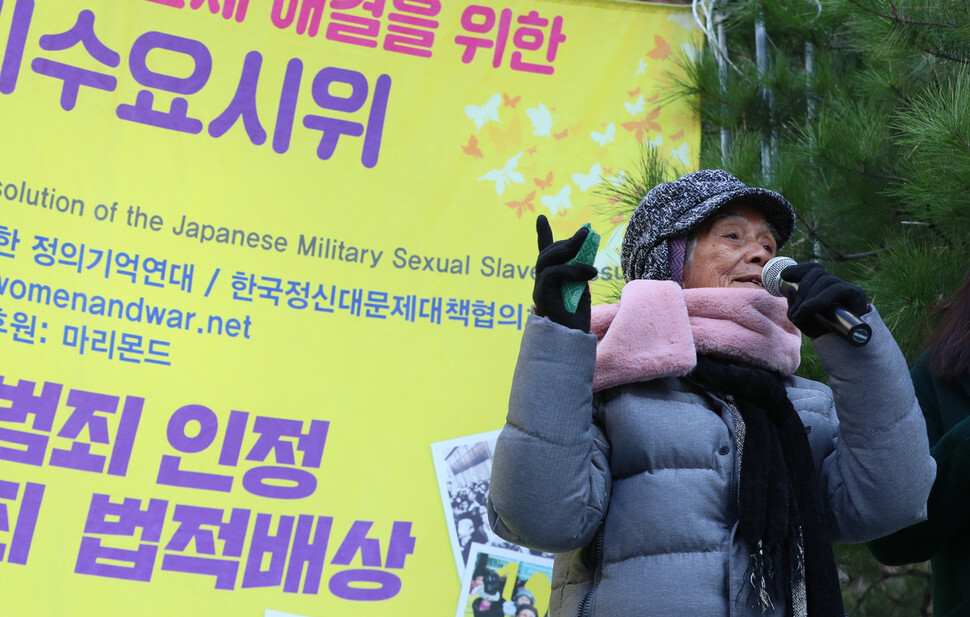hankyoreh
Links to other country sites 다른 나라 사이트 링크
Filipina comfort women survivors attend their first Wednesday demonstration

At noon on Nov. 20, the 1,414th Wednesday Demonstration was held in front of the former Japanese Embassy in Seoul’s Jongno District by the Korean Council for Justice and Remembrance for the Issues of Military Sexual Slavery by Japan. Amid chilly temperatures of three degrees below zero, two elderly women from a warm country stood on the street, covered from head to toe in padded jumpers, cold weather hats, thick scarves, and gloves.
Visiting from the Philippines, the women were Narcisa Claveria, 89, and Estelita Dy, 90 -- both survivors of drafting as Japanese military “comfort women.” It was the first time either of them had participated in a Wednesday demonstration. They were greeted by Lee Yong-su, 91, a South Korean comfort woman survivor who was attending her first Wednesday demonstration in some time. Sitting side by side, the three women denounced the actions of the Japanese government and demanded a resolution to and official apology for the sexual slavery issue.
During a “Comfort Woman Survivor Remembrance Day” event held on Aug. 14 near the presidential palace in Manila, Claveria recalled being “taken to a Japanese military post in the northern Philippines province of Abra when I was 13 or 14 and being kept there as a sexual slave for three months.”
“We had no way of resisting at the time, and the Japanese soldiers were so brutal,” she said.
At the same event, Dy remembered, “When I was 14, I was captured while fleeing the Japanese forces and kept as a sexual slave for three weeks. During the day, I cleaned up and did the laundry, and at night I was raped by two or more Japanese soldiers.”
The Filipino government has estimated that thousands of Filipina women were victimized as Japanese military comfort women during World War II between the years 1942 and 1945. Around a dozen are known to still be alive.

“I want to see justice before I die”
Taking the microphone during the demonstration, Claveria said, “I don’t know what kind of apology Japan has made to date.”
“I want to see justice before I die,” she added.
She went on to say she was “so happy and grateful to be here in South Korea.”
“In the Philippines, we didn’t have anybody siding with us, and we’re grateful for the support,” she said.
In response, Lee said, “What I want is UNESCO registration [of historical materials related to the comfort women system], and Japan has been distorting and obstructing that.”
“Japan should cooperate with the UNESCO registration so that growing people are aware of history and something like this never happens again,” she continued.
The demonstration participants called on the Japanese government to undertake a thorough investigation of crimes perpetrated under the military sexual slavery system and officially apologize to the victims. Delivering a progress report, Korean Council Chairperson Yoon Mee-hyang said, “Liberation will come and the war will end for us when the Japanese government apologizes, acknowledges its crimes, and provides an official apology and compensation according to the law.”
“Rather than attempting petty ploys, the Japanese government needs to acknowledge its crimes, kneel in official apology before the victims, and give them lawful compensation,” she insisted.
The demonstration was also attended by an estimated 300 members of the public (according to the organizers), including elementary, middle, and high school students from Sacheon Elementary School in Gangneung, Gangwon Province, Baeksan Middle School in Buan, North Jeolla Province, and elsewhere. The attendees chanted rallying cries while holding up signs with messages reading, “If you don’t apologize, we’ll take this all the way” and “We are witnesses.”
By Kang Jae-gu, staff reporter
Please direct comments or questions to [english@hani.co.kr]

Editorial・opinion
![[Column] How tragedy pervades weak links in Korean labor [Column] How tragedy pervades weak links in Korean labor](https://flexible.img.hani.co.kr/flexible/normal/500/300/imgdb/original/2024/0703/8717199957128458.jpg) [Column] How tragedy pervades weak links in Korean labor
[Column] How tragedy pervades weak links in Korean labor![[Column] How opposing war became a far-right policy [Column] How opposing war became a far-right policy](https://flexible.img.hani.co.kr/flexible/normal/500/300/imgdb/original/2024/0702/5017199091002075.jpg) [Column] How opposing war became a far-right policy
[Column] How opposing war became a far-right policy- [Editorial] Korea needs to adjust diplomatic course in preparation for a Trump comeback
- [Editorial] Silence won’t save Yoon
- [Column] The miscalculations that started the Korean War mustn’t be repeated
- [Correspondent’s column] China-Europe relations tested once more by EV war
- [Correspondent’s column] Who really created the new ‘axis of evil’?
- [Editorial] Exploiting foreign domestic workers won’t solve Korea’s birth rate problem
- [Column] Kim and Putin’s new world order
- [Editorial] Workplace hazards can be prevented — why weren’t they this time?
Most viewed articles
- 110 days of torture: Korean mental patient’s restraints only removed after death
- 2In the blink of an eye, an unthinkable crash turned a night out into a nightmare
- 3[Column] How tragedy pervades weak links in Korean labor
- 4[Column] How opposing war became a far-right policy
- 5Experts cast doubt on driver’s claim that sudden unintended acceleration caused deadly crash
- 6Democrats seek to impeach 4 prosecutors, including those tied to probes into Lee Jae-myung
- 7Families, friends mourn loved ones cut down in prime in deadly car crash
- 8At shareholders' meeting, Hankyoreh renews commitment to the public
- 9Korea to create dedicated population strategy ministry to combat low birth rate, aging society
- 101 in 10 marriages in Korea last year was with a foreign national